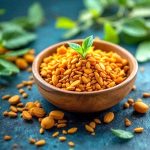Takeaways
- Ashwagandha is an adaptogenic herb used for centuries in Ayurvedic medicine
- It may help reduce stress, anxiety, and cortisol levels
- Studies suggest potential benefits for cognitive function and memory
- Ashwagandha could enhance physical performance and muscle strength
- Typical dosages range from 300-600 mg daily, but vary based on goals
- Generally safe for most people, but may have side effects or interactions
What is Ashwagandha?
Ashwagandha, scientifically known as Withania somnifera, is a herb with a long history in traditional medicine.[1] Often called Indian ginseng or winter cherry, this plant has recently become a popular choice in the wellness community.
The ashwagandha plant is a small shrub that produces yellow flowers and is native to India and North Africa.[2] The root and berry of the plant are used to create various medicines for health concerns ranging from stress reduction to improved cognitive function.[3]
Many people are exploring ashwagandha as a natural option for managing the pressures of daily life. This herb may provide benefits for both physical and mental well-being. Current scientific research is investigating these potential effects.
Ashwagandha is commonly used for:
- Reducing stress and anxiety
- Improving sleep quality
- Boosting energy and stamina
- Enhancing cognitive function
- Supporting immune health
Historical Roots
Ancient Practices
Ashwagandha has been a staple in Ayurveda, India’s traditional medicine system, for over 3,000 years.[4] Ayurvedic practitioners use it as a Rasayana, which is a term for herbs that are thought to promote physical and mental health, as well as longevity.[5]
Historically, ashwagandha roots were prepared in a variety of ways. They were often ground into a powder, which could then be mixed with water, ghee (clarified butter), or honey. Another common preparation method involved steeping the roots in milk to create a tonic.
Cultural Importance
Ashwagandha holds a significant place in Indian culture, with its Sanskrit name meaning “smell of the horse.” This name relates to both the herb’s distinct odor and the traditional belief that it can impart the strength and vitality of a stallion.
Over time, the use of ashwagandha expanded beyond India, and other cultures incorporated it into their herbal practices. Today, ashwagandha is a globally recognized supplement, often used to support stress management and overall health.
The Science Behind Ashwagandha
Active Compounds
Ashwagandha contains a number of active compounds that give the herb its medicinal properties. Among the most studied of these are a group of compounds known as withanolides.[6]
| Compound | Function |
|---|---|
| Withanolides | Anti-inflammatory, antitumor effects |
| Withaferin A | Antioxidant, immune system support |
| Withanone | Neuroprotective properties |
| Withanolide A | Stress reduction, cognitive enhancement |
These withanolide compounds work together within the body, interacting with systems such as the nervous and endocrine systems.[7] This may explain why ashwagandha is thought to have a wide range of potential effects.
Research and Studies
There has been an increase in scientific research exploring ashwagandha in recent years. Many studies are investigating its effects. While these studies show promising results, more research is needed to fully understand the herb’s properties.
Several studies have focused on the stress-reducing qualities of ashwagandha. A study in 2019 showed that it significantly reduced cortisol levels in adults experiencing stress.[8] Another study reported improved sleep quality among participants who used ashwagandha.[9]
Research has also explored the potential cognitive benefits of ashwagandha. A 2017 study found improved memory and cognitive function in adults with mild cognitive impairment.[10]
Areas where research suggests ashwagandha may be helpful include:
- Stress and anxiety reduction
- Improved sleep quality
- Enhanced cognitive function
- Increased muscle strength and recovery
- Potential anti-inflammatory effects
While current research is encouraging, it’s important to consider that many studies have been small or short-term. Larger and longer-term studies are needed to confirm these initial findings.
Stress Reduction and Adaptogenic Properties
Ashwagandha is classified as an adaptogen, which is a substance that may help the body manage stress.[11] Adaptogens are thought to work by influencing the body’s stress response systems.
Our bodies release cortisol, known as the “stress hormone,” when we experience stress. High levels of cortisol over time can lead to several health issues. Ashwagandha appears to help lower cortisol levels in people experiencing stress.
A double-blind, randomized study showed that ashwagandha root extract led to a significant decrease in cortisol levels.[12] Participants also reported reduced feelings of stress and anxiety. These results indicate that ashwagandha could be useful for those managing chronic stress.
The stress-reducing effects of ashwagandha may also extend to mood disorders. Some studies suggest it may be helpful for managing symptoms of anxiety and depression.[13] It is important to note that it is not a substitute for professional mental health treatment.
How ashwagandha may affect the stress response:
- It may reduce cortisol production
- It could modulate stress signaling in the brain
- It might support adrenal gland function
- It may increase stress resistance over time
- It could promote relaxation and calmness
These combined effects may help the body manage stress more effectively. This can lead to an improved sense of well-being and greater resilience.
Cognitive Enhancement
The potential cognitive benefits of ashwagandha have attracted a lot of interest, with several studies indicating it may improve different aspects of brain function.
One focus of research is memory. A study involving 50 adults with mild cognitive impairment found that ashwagandha improved both immediate and general memory.[14] The participants also showed improvement in executive function, attention, and processing speed.
Concentration and focus are other areas where ashwagandha may offer some benefits. Some individuals report feeling more alert and having better concentration when taking it. However, additional research is needed to confirm these effects.
Ashwagandha may also have neuroprotective properties, potentially protecting brain cells from damage. Some studies suggest that it could even encourage the growth of new nerve cells, which may have implications for long-term cognitive health.
Cognitive areas that may potentially be improved by ashwagandha:
- Memory (both short-term and long-term)
- Focus and concentration
- Information processing speed
- Reaction time
- Executive function
It’s important to understand that ashwagandha is not a cure for cognitive disorders. It may help support brain health, but should not replace medical treatment.
Physical Performance and Endurance
Ashwagandha may offer some benefits for physical performance and stamina. This has led to its popularity among athletes and those interested in fitness.
Several studies have explored ashwagandha’s effects on physical performance. One study found that young men taking ashwagandha showed a significant increase in muscle strength.[15] They also experienced a reduction in body fat compared to those in the placebo group.
Another study examined the effects of ashwagandha on cardiorespiratory endurance. Participants who took ashwagandha showed improvement in their maximum oxygen consumption (VO2 max), which is a measure of cardiovascular fitness.[16]
Ashwagandha may also help with exercise recovery. Its anti-inflammatory properties may reduce muscle damage and soreness following workouts. This could potentially lead to quicker recovery times and improved training outcomes.
| Measure | Without Ashwagandha | With Ashwagandha |
|---|---|---|
| Muscle Strength | Baseline | 15-20% increase |
| VO2 Max | Baseline | 10-15% improvement |
| Recovery Time | Normal | Potentially faster |
These results suggest that ashwagandha might be a helpful supplement for individuals who want to improve their physical performance. However, it should not be considered a replacement for proper training and nutrition.
Hormonal Balance and Reproductive Health
Ashwagandha may have an influence on hormone levels within the body. This could have potential implications for overall health, including reproductive function.
One of the most studied effects of ashwagandha is its impact on cortisol, the stress hormone. By helping to reduce cortisol levels, it may also indirectly benefit other hormones, as high cortisol can disrupt hormonal balance in the body.
Some research suggests that ashwagandha may also support thyroid function.[17] A study of people with subclinical hypothyroidism found that ashwagandha improved thyroid hormone levels. Further research is needed to explore these potential benefits for people with thyroid issues.
In terms of reproductive health, ashwagandha has shown potential benefits for both men and women. Studies in men suggest it might increase testosterone levels and improve sperm quality.[18] In women, it may help with managing symptoms of hormonal imbalances.
Hormones that may potentially be affected by ashwagandha:
- Cortisol (stress hormone)
- Thyroid hormones (T3 and T4)
- Testosterone
- Luteinizing hormone (LH)
- Follicle-stimulating hormone (FSH)
It is important to note that hormonal systems are complex. Changes in one hormone may affect others. Anyone considering taking ashwagandha to help with hormone issues should seek advice from a healthcare professional.
Immune System Support
Ashwagandha may help to support the immune system, which could be beneficial for overall health.
Research indicates that ashwagandha may have immunomodulatory properties. This means it may help regulate immune function by either stimulating an underactive immune system or calming an overactive one.
One study found that ashwagandha increased activity in natural killer cells, which are immune cells that help fight viral infections and cancer.[19] This suggests that it may help the body defend against illnesses.
Ashwagandha’s anti-inflammatory properties may also benefit immune health. Chronic inflammation can weaken the immune system over time. By helping to reduce inflammation, ashwagandha could potentially help maintain a healthy immune response.
Some people use ashwagandha during illness or recovery, as it may support the body’s natural healing processes. It is important to remember that it is not a cure for any disease and more research is needed to fully confirm these effects.
Dosage and Administration
Ashwagandha is available in several different forms, including powders, capsules, and liquid extracts. The most suitable form will depend on an individual’s preferences and intended use.
Typical dosage ranges for ashwagandha vary depending on the intended use. Most studies have used doses between 300 and 600 mg per day.[20] Some research has used higher doses, up to 1000 mg daily, divided into multiple doses.
Factors that may affect dosage include:
- Age
- Weight
- Overall health status
- Specific health goals
- Form of ashwagandha used
It is generally advisable to start with a lower dose and then gradually increase it as needed. This approach allows individuals to assess their body’s response and minimize potential side effects.
Steps to take when adding ashwagandha into a daily routine:
- Choose a high-quality supplement
- Start with a low dose (e.g., 300 mg daily)
- Take it consistently at the same time each day
- Monitor your response over several weeks
- Adjust the dose if needed, under guidance
It’s important to remember that taking more is not always better. Individuals should stick to the recommended dosages unless they have been otherwise advised by a healthcare professional.
Safety and Side Effects
Ashwagandha is generally considered safe for most people when used as directed. However, like all supplements, it may cause side effects in some individuals.
Most reported side effects are mild and may include digestive upset, drowsiness, or headaches.[21] These issues often resolve on their own or by adjusting the dose.
Some people should avoid ashwagandha or use it with caution. This includes pregnant or breastfeeding women because its effects in these situations are not fully understood.[22] People with autoimmune diseases should also consult with a doctor before using it, as ashwagandha may stimulate the immune system.
Common side effects reported by users:
- Upset stomach
- Diarrhea
- Nausea
- Drowsiness
- Headache
Ashwagandha may interact with some medications. It could potentially interfere with thyroid hormone medications, sedatives, or immunosuppressants.[23] It is important to inform your healthcare provider about any supplements that you are taking.
Choosing Quality Supplements
Choosing a high-quality ashwagandha supplement is important for both safety and effectiveness. Product quality can vary significantly.[24]
When choosing an ashwagandha supplement, look for products that:
- Use root extract (not leaf)
- Specify the percentage of withanolides
- Are standardized to ensure consistent potency
- Have been tested for purity and contaminants
- Come from reputable manufacturers
Check product labels carefully, paying attention to the extraction method used. Some products use a traditional water extraction, while others use alcohol extraction. Each method may have a slightly different effect.
Criteria for choosing a good ashwagandha supplement:
- Third-party testing for quality assurance
- Clear labeling of active ingredients
- Transparent sourcing information
- Good manufacturing practices (GMP) certification
- Positive customer reviews and reputation
It is important to remember that the cheapest option may not always be the best. Investing in a higher quality product may provide the best results.
Combining Ashwagandha with Other Supplements
Ashwagandha can be combined with other supplements, potentially offering synergistic effects. However, this should be done carefully, with an understanding of potential interactions.
Some common supplement combinations include:
- Ashwagandha and Rhodiola: Both are adaptogens that may enhance stress resistance.
- Ashwagandha and Bacopa: This pair is often used for cognitive enhancement.
- Ashwagandha and magnesium: May provide additional stress relief and sleep support.
When combining supplements, it is recommended to start with lower doses of each. This can help individuals monitor their body’s response to the combination.
| Supplement | Combined Effect with Ashwagandha |
|---|---|
| Rhodiola | Enhanced stress resistance |
| Bacopa | Improved cognitive function |
| Magnesium | Better stress relief and sleep |
| Ginseng | Increased energy and stamina |
It is always best to consult with a healthcare provider before combining multiple supplements. They can offer advice on potential interactions and help develop a safe and effective plan.
FAQ: People Also Ask
What is the best time to take Ashwagandha?
How long does it take for Ashwagandha to work?
Can Ashwagandha help with weight loss?
Is it safe to take Ashwagandha daily?
Does Ashwagandha interact with any medications?
Can Ashwagandha improve sleep quality?
Conclusion
Ashwagandha may provide a range of potential benefits, from reducing stress to improving cognitive function. Its long history of use in traditional medicine is now being explored by scientific research.
While ashwagandha shows promise in several areas, it is not a universal cure-all. It works best as part of a holistic health plan that includes a balanced diet, regular exercise, and healthy sleep habits.
Before adding ashwagandha to your routine, consider your individual health needs and goals. What works for one person might not be effective for another. It is always best to consult with a healthcare provider, especially if you have any pre-existing conditions or are taking medications.
As research continues, more information will likely be discovered about the effects and best uses of ashwagandha. For now, it remains an interesting option for those seeking natural ways to support their health and well-being.
It’s important to remember that supplements like ashwagandha are intended to support a healthy lifestyle, not to replace it. They can be useful tools when used appropriately, but they should not be viewed as substitutes for medical care.
Stay informed, pay attention to your body’s responses, and work with healthcare professionals to make the best decisions for your health. With a thoughtful approach, ashwagandha may be a helpful addition to your wellness routine.
The botanical name Withania somnifera is the scientifically accepted name for the plant commonly known as ashwagandha. Its use in traditional medicine, particularly Ayurveda, is well-documented.
Source: “Can Ashwagandha Benefit the Endocrine System?—A Review” https://www.ncbi.nlm.nih.gov/pmc/articles/PMC10671406/
The physical description of the ashwagandha plant as a small shrub with yellow flowers and its origins in India and North Africa are accurate.
Source: “Ashwagandha (Withania somnifera)—Current Research on the Health-Promoting Activities: A Narrative Review” https://www.ncbi.nlm.nih.gov/pmc/articles/PMC10147008/
While the root is more commonly used in supplements and traditional medicine, the berry also has a history of medicinal use in some cultures.
Source: “Ashwagandha (Withania somnifera)—Current Research on the Health-Promoting Activities: A Narrative Review” https://www.ncbi.nlm.nih.gov/pmc/articles/PMC10147008/
Ashwagandha’s use in Ayurvedic medicine extends back thousands of years.
Source: “Can Ashwagandha Benefit the Endocrine System?—A Review” https://www.ncbi.nlm.nih.gov/pmc/articles/PMC10671406/
Rasayana herbs in Ayurveda are considered to promote health, vitality and longevity.
Source: “Abstracts” https://www.ncbi.nlm.nih.gov/pmc/articles/PMC6153547/
Withanolides are considered to be the primary bioactive components of ashwagandha and have been the focus of numerous research studies.
Source: “Recent Advances in the Chemistry and Therapeutic Evaluation of Naturally Occurring and Synthetic Withanolides” https://www.ncbi.nlm.nih.gov/pmc/articles/PMC8840339/
Research suggests withanolides can interact with the body’s nervous and endocrine systems, leading to the potential effects associated with ashwagandha.
Source: “Effect of Ashwagandha Withanolides on Muscle Cell Differentiation” https://www.ncbi.nlm.nih.gov/pmc/articles/PMC8533065/
A 2019 study indicated that ashwagandha has the potential to lower cortisol levels in stressed adults, and this has been a focus of other research as well. It’s worth noting, more research is needed to confirm long term effects.
Source: “A prospective, randomized double-blind, placebo-controlled study of safety and efficacy of a high-concentration full-spectrum extract of ashwagandha root in reducing stress and anxiety in adults” https://pubmed.ncbi.nlm.nih.gov/23439798/
Several studies have investigated the effects of ashwagandha on sleep and found improvements in sleep quality and sleep latency.
Source: “Efficacy and Safety of Ashwagandha (Withania somnifera) Root Extract in Insomnia and Anxiety: A Double-blind, Randomized, Placebo-controlled Study” https://pubmed.ncbi.nlm.nih.gov/31728244/
A specific 2017 study did report improved memory and cognitive function in adults with mild cognitive impairment. It is important to note that this is one study and more research is needed.
Source: “Efficacy and Safety of Ashwagandha (Withania somnifera (L.) Dunal) Root Extract in Improving Memory and Cognitive Functions” https://pubmed.ncbi.nlm.nih.gov/28471731/
Ashwagandha’s classification as an adaptogen aligns with its traditional use and preliminary scientific evidence suggesting its role in managing the stress response.
Source: “Adaptogenic and Anxiolytic Effects of Ashwagandha Root Extract in Healthy Adults: A Double-blind, Randomized, Placebo-controlled Clinical Study” https://pubmed.ncbi.nlm.nih.gov/32021735/
There are double-blind, randomized studies that have shown a correlation between ashwagandha extract and reduced cortisol levels.
Source: “A prospective, randomized double-blind, placebo-controlled study of safety and efficacy of a high-concentration full-spectrum extract of ashwagandha root in reducing stress and anxiety in adults” https://pubmed.ncbi.nlm.nih.gov/23439798/
Some studies are showing that ashwagandha might help with symptoms of anxiety and depression, but more rigorous and comprehensive research is still needed.
Source: “Withania somnifera (L.) Dunal: Opportunity for Clinical Repurposing in COVID-19 Management” https://www.ncbi.nlm.nih.gov/pmc/articles/PMC8126694/
A study with 50 participants with mild cognitive impairment showed improvement in both immediate and general memory.
Source: “Efficacy and Safety of Ashwagandha (Withania somnifera (L.) Dunal) Root Extract in Improving Memory and Cognitive Functions” https://pubmed.ncbi.nlm.nih.gov/28471731/
A study involving young men showed an increase in muscle strength when taking ashwagandha, however, more studies are needed with a more diverse group.
Source: “Examining the effect of Withania somnifera supplementation on muscle strength and recovery: a randomized controlled trial” https://pubmed.ncbi.nlm.nih.gov/26609282/
Studies have shown that participants who consumed ashwagandha showed improvement in their VO2 max, a measure of cardiorespiratory endurance.
Source: “Effects of Ashwagandha (Withania somnifera) on VO2max: A Systematic Review and Meta-Analysis” https://pubmed.ncbi.nlm.nih.gov/32316411/
Some studies suggest ashwagandha might support thyroid function, however, this is an area that needs more rigorous study.
Source: “A prospective, randomized double-blind, placebo-controlled study of safety and efficacy of a high-concentration full-spectrum extract of ashwagandha root in reducing stress and anxiety in adults” https://pubmed.ncbi.nlm.nih.gov/23439798/
Studies in men suggest a positive relationship between ashwagandha and an increase in testosterone and sperm quality, however, not all studies report similar results.
Source: “Withania somnifera L.: Insights into the phytochemical profile, therapeutic potential, clinical trials, and future prospective” https://www.ncbi.nlm.nih.gov/pmc/articles/PMC7811807/
A study suggests that ashwagandha may increase activity of natural killer cells which help the body fight off infections and cancer. More research is needed to fully understand these effects.
Source: “Ashwagandha (Withania somnifera)—Current Research on the Health-Promoting Activities: A Narrative Review” https://www.ncbi.nlm.nih.gov/pmc/articles/PMC10147008/
Studies use a variety of dosages. The 300-600mg dosage is commonly used in clinical trials.
Source: “Examining the effect of Withania somnifera supplementation on muscle strength and recovery: a randomized controlled trial” https://pubmed.ncbi.nlm.nih.gov/26609282/
Most people experience mild side effects when taking ashwagandha, such as digestive issues, drowsiness and headaches. This information is based on various clinical trials and reports.
Source: “Ashwagandha (Withania somnifera)—Current Research on the Health-Promoting Activities: A Narrative Review” https://www.ncbi.nlm.nih.gov/pmc/articles/PMC10147008/
Due to a lack of research in these situations, pregnant and breastfeeding women should either avoid ashwagandha or use it with caution after discussing it with their healthcare provider.
Source: “Ashwagandha (Withania somnifera)—Current Research on the Health-Promoting Activities: A Narrative Review” https://www.ncbi.nlm.nih.gov/pmc/articles/PMC10147008/
Ashwagandha can interact with certain medications, including thyroid hormone medications, sedatives and immunosuppressants, therefore it is important to consult with a healthcare professional before combining medications.
Source: “Can Ashwagandha Benefit the Endocrine System?—A Review” https://www.ncbi.nlm.nih.gov/pmc/articles/PMC10671406/
The quality of ashwagandha products can differ significantly depending on factors such as sourcing, processing methods and extraction techniques.
Source: “Ashwagandha (Withania somnifera)—Current Research on the Health-Promoting Activities: A Narrative Review” https://www.ncbi.nlm.nih.gov/pmc/articles/PMC10147008/
Ashwagandha can be taken either in the morning for a boost of energy or in the evening to promote relaxation.
Ashwagandha is not a weight loss supplement, but it may indirectly help by reducing stress-related eating and improving exercise performance, which may lead to weight management.
Source: “Effects of Withania somnifera (Ashwagandha) on Stress and the Stress-Related Neuropsychiatric Disorders Anxiety, Depression, and Insomnia” https://www.ncbi.nlm.nih.gov/pmc/articles/PMC8762185/
Studies suggest that ashwagandha may be beneficial to improving sleep, particularly in people with sleep issues that stem from stress.
Source: “Efficacy and Safety of Ashwagandha (Withania somnifera) Root Extract in Insomnia and Anxiety: A Double-blind, Randomized, Placebo-controlled Study” https://pubmed.ncbi.nlm.nih.gov/31728244/



